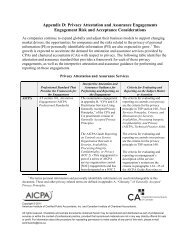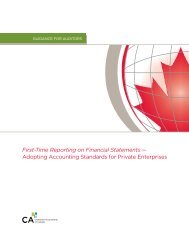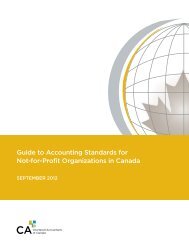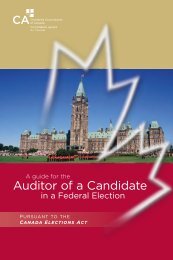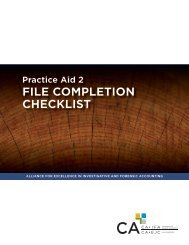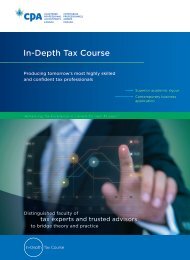20 Questions - Canadian Institute of Chartered Accountants
20 Questions - Canadian Institute of Chartered Accountants
20 Questions - Canadian Institute of Chartered Accountants
You also want an ePaper? Increase the reach of your titles
YUMPU automatically turns print PDFs into web optimized ePapers that Google loves.
Strategic Planning y continued z9. How sound are the assumptionsbehind the strategy?Behind every strategy and budget there are a number <strong>of</strong> assumptions. Thesemay or may not be valid. Experienced boards and managers know the value <strong>of</strong>challenging assumptions and considering what could be done if things turn outdifferently – a variety <strong>of</strong> “scenarios”.For example: an organization might develop its strategies on the assumptionthat:• It will continue to enjoy benefits it currently receives – government grants,the use <strong>of</strong> facilities at reasonable cost, etc.• There will be no changes to the ground rules – legislation, rules andregulations - that affect the organization (new taxes or requirements related tohealth, safety, accessibility, environment, reporting, etc)• New strategies will be attractive and successful• Projects will come in on time and on budget• Donors, sponsors and volunteers will continue their support• Current programs will continue to be effective and affordableThis list is an example <strong>of</strong> one scenario – but there will be others. Each <strong>of</strong> theassumptions could vary, with consequences for the organization. The process <strong>of</strong>“scenario analysis” calls for projecting the potential effects <strong>of</strong> several differentassumptions or scenarios. It begins by asking:• What other assumptions might be appropriate?• How might things turn out under different assumptions?• How probable are the different assumptions?From the answers it is possible to identify the most probable scenarios, developstrategies that could succeed in most cases, and consider alternative strategiesfor use if necessary.It is impossible to anticipate and plan for every possible scenario. However,discussing the assumptions and the potential consequences <strong>of</strong> their changingcan strengthen the planning process.Recommended practices• The strategic plan describes the assumptions on which the plan is based• The strategic planning process includes identifying and testing strategiesusing some form <strong>of</strong> scenario analysis10. How will accomplishments be measured? 4“What gets measured gets done” is an <strong>of</strong>ten-used phrase simply because it is true.Measures <strong>of</strong> success – objectives - <strong>of</strong>ten end up defining success, and the properdetermination <strong>of</strong> a measure is vital to achieving the strategy.Good strategic and operational planning includes measurable objectives thatreflect and build on actual results and achievements. This is not always easyfor not-for-pr<strong>of</strong>its whose legal purpose is <strong>of</strong>ten expressed in terms <strong>of</strong> meeting asocial need.Some organizations find it helpful to develop a sequence <strong>of</strong> targets that beginswith the activities <strong>of</strong> their staff and volunteers (outputs), continues with theresponse <strong>of</strong> the community (intermediate outcomes) and builds towards thedesired results (ultimate or end outcomes). Cause and effect are hard to measureand prove, particularly in the short run. For this reason, although outputsand intermediate outcomes can be usefully measured as short-term targets,ultimate outcomes and their trends are better evaluated over a longer term.There are, essentially, two types <strong>of</strong> measurement: quantitative and qualitative.Quantitative measures record activities and other things that can be countedsuch as the number <strong>of</strong> people who attended an event, the number <strong>of</strong> servicesprovided, etc. They include financial results. As such they can be measures <strong>of</strong>the organization’s efficiency in getting things done. Funding agencies <strong>of</strong>ten askfor quantitative information in their grant application forms.Qualitative measures deal with opinions and feelings – very important considerationsfor not-for-pr<strong>of</strong>its – and thus with the organization’s effectiveness124 The material in this question is taken from CICA’s <strong>20</strong> <strong>Questions</strong> Directors <strong>of</strong> Not-for-pr<strong>of</strong>it OrganizationsShould Ask about Governance (Question 18).




